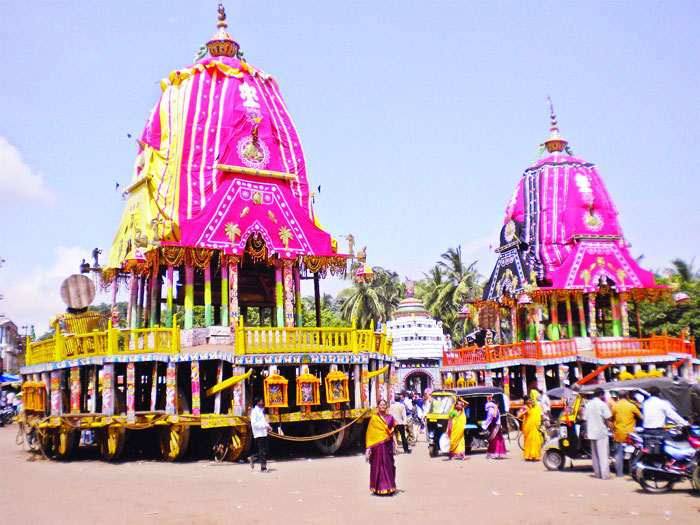The linkages between lord Jagannath and Muslims are three centuries old, says Debajani Mohanty
Eid-ul-Fitr, which signals the end of the holy month of Ramadan when Muslims all over the world fast, pray and give alms to the poor, this year was followed by the auspicious day of Rath Yatra. This is a day when Hindus universally chant, sing and dance to display their immense devotion towards Jagannatha, the lord of the universe. History might be replete with stories of hate between the two communities be it during the Islamic invasion, Partition or the riots that have marred the country, but there is a beautiful Jagannatha tradition according to which the two religions coexist peacefully, even today.
The Rath Yatra or the car festival is one of the oldest Hindu festivals in the world and it can be seen in its most magnificent form at Puri, in the eastern state of Odisha. Just as a pilgrimage to Kaaba is mandatory for every able Muslim at least once in their life time, for Hindus a visit to the fourDhamas as defined by Adi Shankaracharya in four corners of the nation, is essential.
Puri the eastern Dhama is named the Sankha Kshetra, as the geographical shape of Puri resembles a conch shell or Sankha and hence has special importance in scriptures. One of the biggest and holiest shrines of lord Vishnu, the temple miraculously survived the onslaught of many invasions and continues to have many secrets that are yet to be unravelled by science.
It’s notable that the grand doors of the temple are open only to those born as Hindus and the administrative committee of the temple has preserved this right for centuries. The priests did not bow down even before the father of nation, Mahatma Gandhi who in 1934 had tried to enter the temple with a few Dalits and lower castes. In 1984, Indira Gandhi, the then Prime Minister of India could not enter the temple as she was considered an outcast because she had married outside the Hindu religion. Similarly, Rabindranath Tagore, B R Ambedkar, Kabir, Guru Nanak and few other eminent personalities could not enter the temple due to different reasons.
The age-old system run by the priests or Pandas discriminates between upper and lower caste people or even between Hindus and non-Hindus but the creator of the Universe doesn’t. Every year on the Ashadh Shukla Dwitiya, during the beginning of rain season, lord Jagannath accompanied by his elder brother Balabhadra and sister Debi Subhadra, comes out of his premises and travels to his maternal Aunt Gundicha Debi’s temple so that people of lower castes as well as those from other religions can see him. Three new giant wooden chariots are constructed every year. The king of Puri, Gajapati himself, cleans the chariot with a broom made up of gold. The chariot is tied to ropes and pulled by thousands of devotees. lakhs of pilgrims from different countries attend the event and crores from all over the globe watch the telecast over national and international television.
The wheels of the chariot, say eye-witnesses, rotate neither with vigour nor valour but only with sheer love and devotion. History as well as folktales are replete with incidents when the massive unstoppable chariot abruptly ceased to move even an inch when an ardent follower of the lord has been wronged or was in need. One such reference goes back to the 17th century to lord Jagannatha’s dearest follower Salabega, a warrior poet of that era. His mother was a Hindu Brahmin widow who was abducted by a Muslim soldier in the Mughal army. like his father, he was brought up as a Muslim and joined the Mughal army. Severely wounded in a war Salabega was on his death bed and no Baidya could cure him.
In those crucial hours, on his mother’s suggestions he worshipped lord Jagannatha and was miraculously healed. Salabega eventually became a great devotee of the lord and started composing Bhajanas or devotional poems that reached the common man and was widely applauded.
Despite being the greatest devotee of Jagannatha, Salabega was not exempted from the stern regulation of temple authorities. Since he was born to a Muslim father, the priests didn’t allow his entry inside the holy shrine during his lifetime. Hence Salabega decided to visit Puri during the festival to get a glimpse of the beloved lord since that’s the only time when Jagannatha goes universal beyond caste, creed and religion. However, on his way he became severely ill and could not reach the spot on time.
Miserable and helpless, Salabega prayed his beloved deity to wait for few moments till he could reach him. The chariot stopped exactly at the spot where Salabega was praying and started moving only after he had viewed the lord to his heart’s content. More than three centuries have passed since this incident but during the car festival Jagannatha’s chariot still stops for few moments in front of the tomb of his beloved devotee, Salabega on Bada Dandaor the grand road of Puri. Salabega’s written Bhajanas are extremely popular in Odisha and especially ‘Ahe nila saila prabala martya barana’ is the morning prayer in many schools across the state.
The devotion of people of other religions towards Jagannatha did not end with Salabega. One of the followers of Jagannatha in the 21st century is Sk Makbul Islam. Born in a family that follows Sufism, Makbul has been researching on history of Jagannatha since 1993 and has authored many books on folktales around the lord. He has been felicitated by Puri Shankaracharya and Gajapati Dibya Singh Deb for his outstanding contributions to the spreading of Jagannatha culture.
























